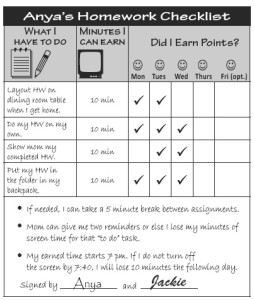 After a recent workshop I gave to parents in McLean, Virginia a mom stopped me and said, “My older son is so frustrated. I’ve tried everything. I just don’t know what to do!” This mom was far from alone. In speaking to parents from all over the Washington DC area, one of the most common concerns revolves around working with a frustrated child. The good news is that we, as parents, can make a positive difference to reduce frustration and improve homework completion. And the even better news is that I have some new tips for you that can make it happen.
After a recent workshop I gave to parents in McLean, Virginia a mom stopped me and said, “My older son is so frustrated. I’ve tried everything. I just don’t know what to do!” This mom was far from alone. In speaking to parents from all over the Washington DC area, one of the most common concerns revolves around working with a frustrated child. The good news is that we, as parents, can make a positive difference to reduce frustration and improve homework completion. And the even better news is that I have some new tips for you that can make it happen.
Four Tips for Managing Frustration
Tip #1 – Talk so Kids Will Listen and Listen So Kids Will Talk
So often, kids who struggle with homework have a negative attitude when it comes to school work, especially the tasks that they find chronically difficult. Math is a good example.
Tip #2 – Break it Down
Help your child break work down into manageable chunks. Use Post-it arrow flags. Place one at the starting point and another part way through the assignment. Explain, “All you have to do is start here and end there. Come and show me your work when you’re done.” Visual learners especially like this approach.
Help your child to get started. Observe the completion of the first item so that you are sure it is done accurately. Then, set a timer for anywhere from six to sixteen minutes (it’s more interesting than five to fifteen). Encourage your child to work as hard as possible during this brief time to get over the hump. Use color. Color code the symbols in math (red for addition, blue for subtraction, green for division, etc.). Start with the “green” problems or give a choice of order.
Cover the bottom portion of the worksheet or put an index card over the more difficult problems. Complete only the visible part first.
Tip #3 – Take a Break from Power Struggles
What should you do when you realize that a disagreement is becoming a power struggle? Extricate yourself ASAP by taking a quick break. Use these words:
“Let’s take a 30 minute break. I’ll be back at 2:34 pm.” Be specific about time.
“We’re both upset. Let’s grab a quick snack and then talk about a compromise.”

Tip #4 – Create a Checklist
Some children need and crave more structure than others. Parents of these youngsters often find that daily routines, rewards, and consequences are just the ticket to good behavior. In other words, your child should always know what to expect and should be clear about incentives and consequences even before she begins schoolwork. You can do this by creating a homework checklist.
First, think about what you want your child to do and narrow the list down to two to four homework-related tasks. Now, determine what it will take to motivate your child. For many kids, it’s “screen time” — the use of the computer, cell phone, and video games. If you are going to use screen time or another privilege as a reward, be sure it’s not available at any other time during the day. Finally, record any other rules below the checklist.
The following checklist belonged to a girl with whom I worked. She was a classic easily frustrated student and managed to engage her parents in daily verbal sparring matches over homework. Once we crafted a checklist and established a certain number of reminders she’d receive from her mother to get on track (she asked for two reminders), her behavior improved significantly.
You can come up with your own ideas, but remember, that once your child earns the reward, you cannot take it away. For example, if she earns 30 minutes of screen time, but then hits her sister, I don’t recommend taking the earned privilege away. Instead, consider another consequence such as a time out. Children are more likely to follow through with incentive programs if they know their “winnings” won’t be withheld.
With just a few creative ideas and a whole lot of patience, you can put your easily frustrated child on the road to academic success.
